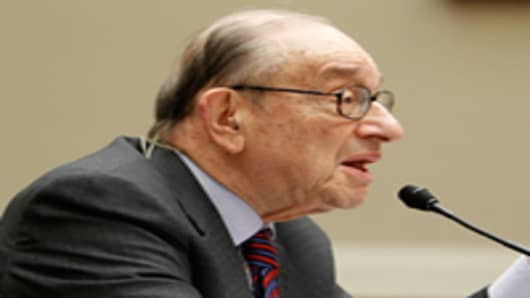Current monetary policy has worked because it has helped lift stock prices which in turn have fueled the economic recovery, former Federal Reserve Chairman Alan Greenspan told CNBC on Friday.
Addressing a gamut of issues, from the European debt crisis to the floundering US housing industry, the former central bank chief said the rising stock market—up more than 80 percent from its March 2009 financial crisis lows—has been pivotal.
"There's a real upward momentum here," he said. "I think we are underestimating and continuing to underestimate how important asset prices, very specifically equity prices, are not only to shareholders but the economy as a whole."
The point is important in that it as at the center of current Fed Chairman Ben Bernanke's efforts. The Fed has dramatically expanded its balance sheet in hopes that more liquidity in the economy will help drive up the prices of riskier assets, particularly stocks.
Such movement helps create psychological momentum that in turns lifts everything else, advocates of the policy say.
Banks were the hardest hit during the financial crisis and have benefited most from the recovery in stock prices
"A very big part of the banks coming out of this was a very dramatic rise in the market value of the equity of the banks," Greenspan said.
Yet he edged towards criticism of some policies during the crisis, particularly the rash of bailouts used to support so-called too-big-to-fail companies.
"Any system in which there are not significant bankruptcies doesn't work," he said.
Turning to Europe and its sovereign debt crisis, Greenspan said other nations there should behave more like Germany, which has addressed looming fiscal problems with a series of tough austerity measures that while unpopular also have proven effective.
The EU debt crisis, in which Ireland recently needed an International Monetary Fund bailout and other smaller countries with heavy sovereign debt loads are expected to follow, arose because of countries not living within the European Union framework.
EU rules restrict countries from running up deficits greater than 3 percent of their total budget, but that restriction has been shattered by a number of countries in the 16-member union.
"Their common interests, if exercised, will generate for each of them benefits," Greenspan said. "You try to get benefits from others—beggar thy neighbor, if you recall—nobody gets anything."
Closer to home, the recovery faces other obstacles, particularly the lackluster performance of the US housing market.
Though pending home sales showed a strong snapback in October, Greenspan he worries about the continued drop in prices. Conversely, he said if prices can start to stabilize that could lead to a significant recovery for the industry.
"If we can manage to hold a little longer and prices start to move up, I think we will finally start to get residential construction moving," Greenspan said. "It's at such a low level, it can really pop up."


